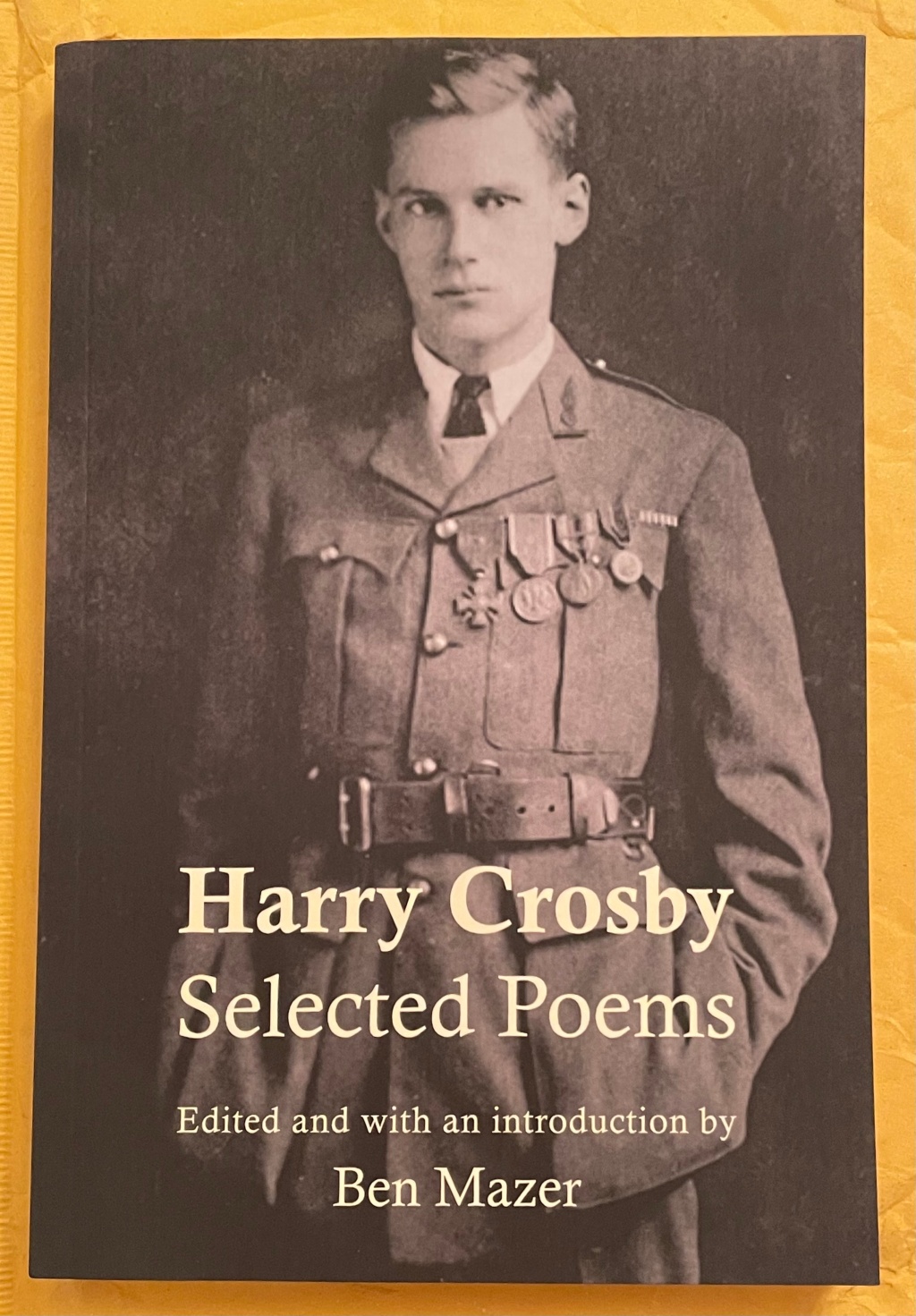Written By: Harry Fry
‘The beauty that I weave for God and for Eternity’ – Proportionate (Harry Crosby)
Harry Crosby, after fighting for the United States in the First World War, embarked on a career irrevocably devoted to the arts that would define his life. Alike to many of his aristocratic ‘Lost Generation’, he wrote poetry in an unchanging format while simultaneously enjoying an overexuberant life in society. Crosby’s work followed the new trend of an unconventional and aesthetic style, leading to his work often being regarded as avant-garde since it importantly endorsed unhealthy and depressive mindsets. Not only did Crosby exemplify overconsumption and living in excess, as well as promoting addiction and routinely damaging one’s own body, he also glamorised his planned suicide that materialised the attitude of his writing. To him, the chaos of society, life and shaping one’s future meant peace could only be found in separating oneself from it, gaining comfort with being in despair and finding completeness in dying. Crosby’s poetry shows art being constructed into reality, through making his ‘beauty’ or ideal actuality.
Promptly after reaching adulthood, Crosby was enlisted into the United States Army and fell into the terrifying nature of modern warfare. Working as a transporter for ambulance services, Crosby was immediately faced with manoeuvring around heavily wounded soldiers and enemy attacks. Although initially writing home with a more objective attitude on the war’s purpose, Crosby quickly became overwhelmed: ‘I saw the most gruesome sight I’ve ever seen… [a man] had no jaws, teeth, or lips left.’ One could argue that the war was a catalyst in Crosby’s later inability to mentally resettle in society, as he sought a way out of it before receiving orders to do so. Upon his return, he found the opposing calmness of Boston too unsettling, likening it to a warfare climate in describing ‘the horrors of Boston.’ He is said to have given his eventual wife an ultimatum to marry him or he would commit suicide, as well as failing at a short career in banking where he regularly turned up intoxicated. With Crosby, his unbending mindset quickly formed: satisfaction needed to be immediate and being patient through following more sensible routes was off the table.
Viewing it as the place to be, Crosby moved to Paris but travelled with others everywhere, including North Africa where he began experimenting with opium. Crosby tattooed his foot with a pagan sun, initiating his obsession with motifs of the sun as a wider reflection of his desires. In his journals, he wrote ‘To guard the Sun I gave my youth to find’ and ‘the sun that purifies but I have sought in vain to find … after the heart’s departure.’ The sun symbolised his ability to act freely without restriction in the world, prioritising action, whether productive or destructive. He chose to ‘guard’ this ironically, as it promoted an excessive and damning lifestyle. Crosby’s hobbies followed a single pattern: allowing himself to fall into hypersexual romantic affairs while married, increasing the frequency of his parties and social events to an extreme, as well as routinely taking opium. Furthermore, he began isolating himself from society by locking himself in hotel rooms with different romantic entanglements, and when coming out of these episodes would party until the daytime. In allowing his ‘heart’s departure’, Crosby explicitly chose to fulfil his sudden desires without fear, yet this did not secure his happiness. Instead, Crosby exacerbated a life of indifference towards his wellbeing, as if he was hinting it would end imminently.
In one of his later works, Crosby writes a piece titled Study For A Soul, where he implicitly argued for his comfort in death: ‘beyond the fear of new and old… the untroubled darkness.’ He aimed to live without anxiety towards being mortal and therefore towards death, harnessing what was grey and unknown to be glamorised and not ‘trouble’ him. His final affair, Josephine, marked a complete breakthrough of not merely writing about the end of one’s life but performing it. Josephine wrote poetry to Crosby, stating ‘Death is our marriage’, and, in response, Crosby professed, ‘One is not in love unless one desires to die with one’s beloved. There is only one happiness: it is love and to be loved.’ In unifying themselves with confidence towards dying, Crosby might have become so swept up in his love for Josephine that he felt secure in ending his story with her. More crucially, he connected love and death as parallels, where the captivating form of love is dying together. In a bid to be found drowned in aestheticism, Crosby fulfils his suicide pact by matching gunshots with Josephine.
Harry Crosby’s vision for his life is unclear, yet simultaneously assured. He precisely constructed a story of virtually impeccable success in overconsuming and overperforming, yet it equally appears profoundly unbalanced and ungrounded. While most scholars discern his poetry as embodying writers of the elite, aristocratic ‘Lost Generation’ in the United States, and perhaps also dismiss him as a bon vivant, one could instead propose his work shows an early attempt at producing the modern aesthetic: romanticising destructive mindsets. This is later exemplified in a wealth of fictional protagonists, whether that be the idealisation of Goethe’s The Sorrows of Young Werther or Richard in Donna Tartt’s The Secret History.
Bibliography
All Poetry, Harry Crosby, https://allpoetry.com/Harry-Crosby.
Mazer. Ben, The Poet-Publisher Who Scorned Death by Pursuing It, 2020, Literary Hub, https://lithub.com/the-poet-publisher-who-scorned-death-by-pursuing-it/.
Goodman. Lanie, Harry and Caresse Crosby, the Lost Generation’s Golden Expatriate Couple, 2017, France Today, https://francetoday.com/culture/art_and_design/harry-and-caresse-crosby-the-lost-generations-golden-expatriate-couple/.
Keene. Ann, T, ‘Crosby, Harry’, 2015, American National Biography Online, Oxford University Press.
Wolff. Geoffrey, Black Sun: The Brief Transit and Violent Eclipse of Harry Crosby, 2003, New York Review of Books, New York.

